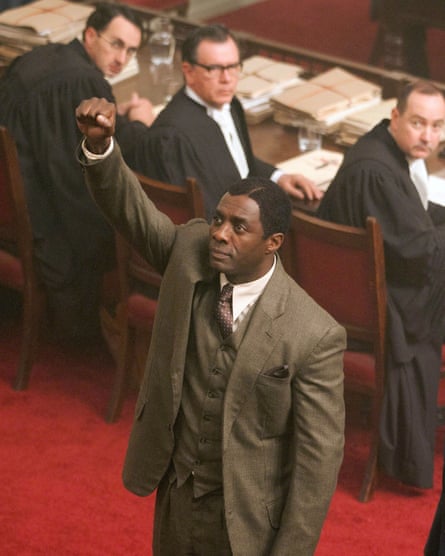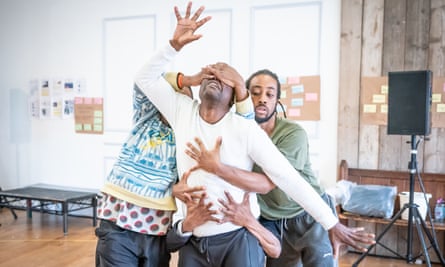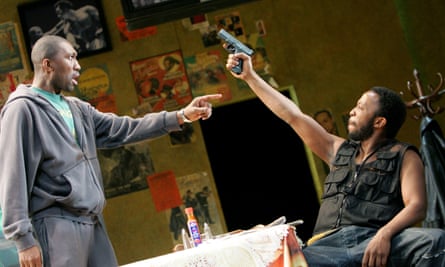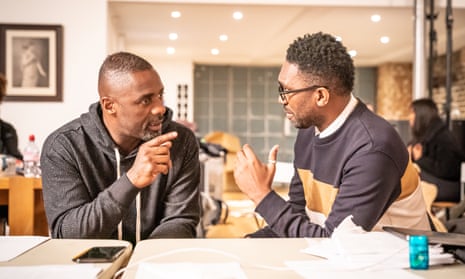Idris Elba has a thing about trees. He’s got a tattoo of one on his left arm, partially hidden today by a black T-shirt – but that’s not all. Whenever Elba needs to mark a major event in his life – birthdays, new years, that kind of thing – he heads outside and wraps his arms around a trunk. “I just feel a massive connection to the roots that are underneath, which are very high and wide, and to the oxygen that comes from the top,” he says. “And then there’s me in the middle … Idris Elba, tree-hugger!”
He lets out a burst of laughter, as does the director Kwame Kwei-Armah. The pair are here today because they’ve collaborated on a new project called, funnily enough, Tree – an ambitious mix of music, dance and drama set to premiere at this year’s Manchester international festival. The pair have known each other for decades but this is the first time they’ve worked together. “The seeds are laid right,” Elba says, and the metaphors continue, with much talk of “cultivating” and “planting” in their creative process.
The production’s “deepest roots”, says Elba, grew from his experience in South Africa playing Nelson Mandela in the film Mandela: Long Walk to Freedom. For inspiration on how to emulate the man, Elba had looked to his own father, who shared Mandela’s infectious smile and similarly pointed with his middle finger – yet shortly after seeing the movie, his dad died. Elba felt compelled to revisit the country and make an album in his father’s honour – 2014’s Mi Mandela – that featured a song called Tree, “which is sort of on the nose, a love letter to my dad”.

Elba wanted to explore the idea of taking the album’s songs to the stage, and so he reached out to Kwei-Armah, artistic director of the Young Vic theatre. “Idris talked to me about putting his arms around this tree, that spiritual moment of connecting with nature. The thing that excited me about it was that, from the jump, Idris was like, ‘Look we could do a musical or we could do a play, but what’s the thing? How do we play with the form? The central pin became this story of a young man going back home to meet his Afrikaners grandmother. [But] I don’t actually think we mention race in the piece at all. What we do is we put people in situations that say, ‘Now read what you need to read’ and ‘How do we negotiate the pain of that?’”
The pair first met years ago, although the specifics are hazy. They became closer while navigating their careers as black British actors in the 1990s, staying in touch as they both achieved success in the US: Elba for his portrayal of Baltimore drug kingpin Stringer Bell in The Wire; Kwei-Armah becoming the artistic director of Centre Stage in 2011, also in Baltimore. Three days after arriving in the city, Kwei-Armah recalls finding out Elba had won a Golden Globe for his Wire role. “I remember sitting in my cousin’s yard, and I texted him, just going, ‘Bruv, man is just so proud of you’ and not expecting to get anything back. [But] straight back, bam, Idris is like ‘Thank you brother.’”
It was on returning to Baltimore, to direct Soul: The Stax Musical in 2018, that Kwei-Armah listened to Mi Mandela again. “I got all goosebumpy,” he says. “My mother had died, and my mother was my everything, so [when] Idris began to speak about his father, and his connection with the universe through this thing …” He trails off. “I went, ‘Come we go. Let’s do this.’”
Now the two men are working with a cast that includes Alfred Enoch, the young black British actor who went to the US to star alongside Viola Davis in the hit series How to Get Away With Murder. Kwei-Armah smiles: “Alfie came to an early workshop, he got off the plane from Brazil, hadn’t even looked at my script. Thank God, because it was really bad then. I completely rewrote it.”

Was the script a collaborative process, too? “We did it together,” Kwei-Armah replies, as Elba points towards Kwei-Armah and stage whispers: “He wrote it.” Not for the first time, they both laugh. Kwei-Armah continues: “Alfie came in, and literally within an hour, our magnificent choreographer, Gregory Maqoma, was holding him upside down.”
The physicality of the show, both on stage and in the way the audience is placed on stage alongside the performers, is inspired by Elba’s dual career as an actor and a DJ. “I play house music, it’s quite insular, but essentially it’s like [the crowd is] climbing into my head, and I’m climbing into theirs. I explained that energy to Kwame.” He says he was aiming for “a different type of listening”, where the audience realise: “‘Oh shit, I’m in the drama!’”
Kwei-Armah nods: “We said, ‘Do you know what, let’s make this a gig.’ I loved that challenge. We had to say, ‘All right there’s going to be no seats, very few seats, people are going to be in the space.’ And that’s hard when it comes to scripting! Because after 10 minutes everyone’s going to be, like, ‘I need to know why I’m standing.’ The challenge is to create a piece of physical theatre that has dance and brilliant music [by Mikey J Asante], and actually include the audience in the storytelling. Will you be thrown about? Probably not thrown. Will you be moved about? Yes. Will you be asked to hold and carry? Yes. Will you be asked to vocally participate? Yes. If we get it right. Will you be asked to be in the play, not just observing? Yes.”
The immersive nature of Tree has leaked into the rehearsal process, with the creators operating a rehearsal room where people are regularly invited in — including me. During the company’s morning briefing, which involves everyone in the space holding hands in a large circle, Kwei-Armah asks how everyone is. One performer speaks candidly about an encounter that reminded her how grateful she feels to be in the space. Another, Patrice Naiambana, mutters an in-joke under his breath that makes Enoch crack up laughing. Elba tells a story about being confronted by South Africans for playing Mandela despite not being of South African heritage.

Earlier, he’d recounted how people had told him he shouldn’t be playing Mandela. “They said, ‘We’ve got actors in South Africa who are qualified.’ And our director was white, and our producer was Indian.”
Eventually they won people over. “At the end of the process, people that were on that cusp about whether I should be there or not, were like, ‘Thank you, I can see you just as being a vessel in playing that.’” As with Kaelo, the protagonist in Tree, there was a sense of “coming home. You get what I’m saying?”
Kwei-Armah does. “Not only do I get what you’re saying, I wish I had articulated that to the cast on day one. The beautiful thing about the DNA of this, the DNA of our lead character, is going, ‘Whoa, where is my legitimacy here, I’ve got to find my way home.’”
The two hope to continue working together, although perhaps in a different capacity. “It isn’t something we’ve really openly discussed, but this isn’t the last pairing,” says Elba. “I haven’t been on stage for a long time, and I’m desperate to do that at some point. I want to come and see my guy again, because watching and being here, I feel like I have work [that is] yet to be put on to the stage.”
But right now they’re just excited to present Tree to the world. “It’s lovely to be able to see something you’ve planted the seed of,” says Elba. “And repot it into a different form”.
Kwei-Armah laughs once more: “This is why we’re going to keep working together. We’ve got to keep these garden metaphors going!”
Tree is at Upper Campfield Market Hall, Manchester, as part of Manchester international festival, 29 June-13 July. Then at the Young Vic, London, 29 July-24 August.
This article was corrected on 25 June 2019; we misspelled the name of Stax the Musical and the character Kaelo.

Comments (…)
Sign in or create your Guardian account to join the discussion